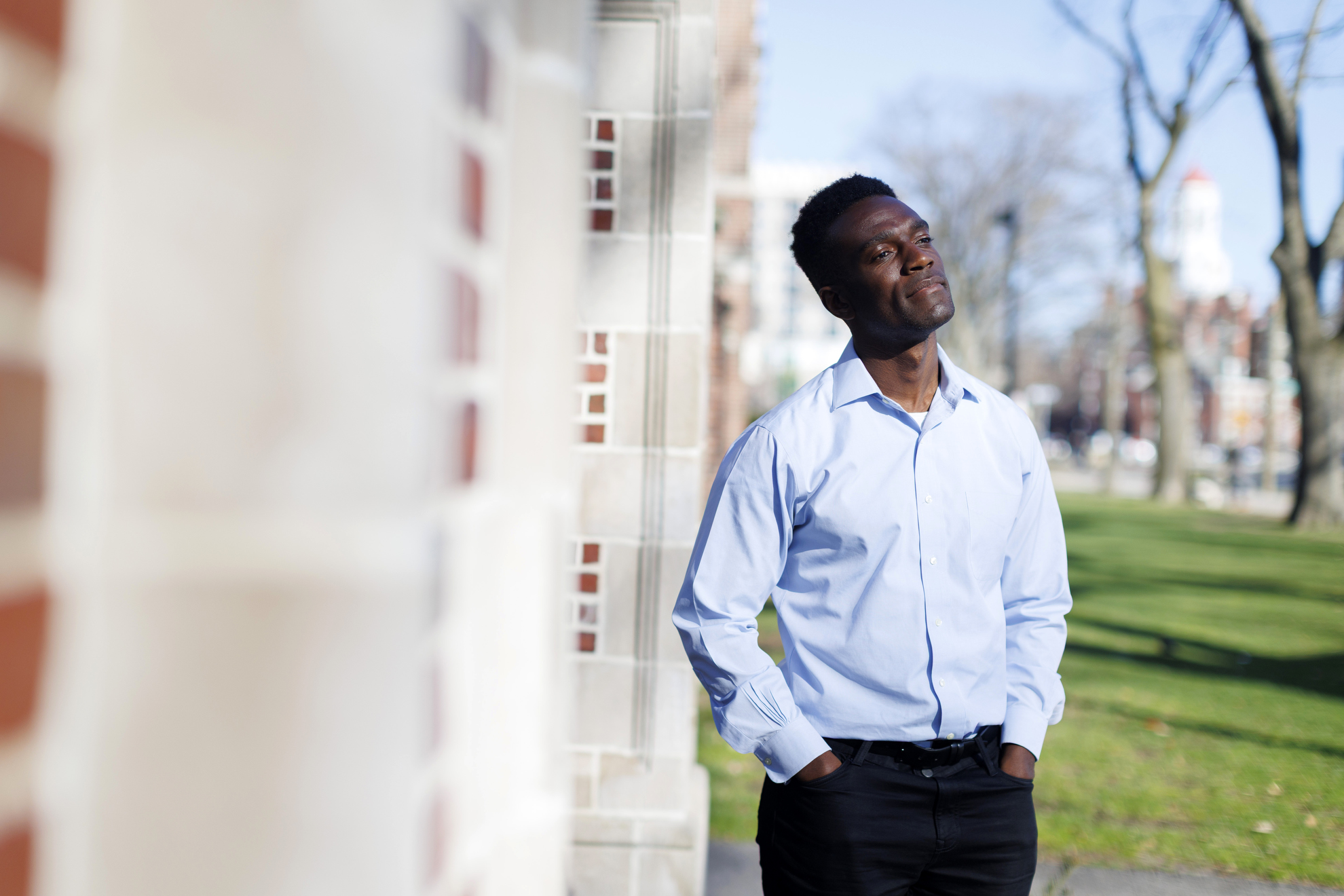
Grant Jones.
Stephanie Mitchell/Harvard Staff Photographer
Healing through music
Grant Jones incorporated love of meditation and listening to R&B, hip-hop into dissertation on mindfulness interventions
Part of the Commencement 2025 series
A collection of features and profiles covering Harvard University’s 374th Commencement.
Grant M. Jones was around 10 years old when he first contemplated becoming a psychologist. A curious child who loved to read and was being raised by his mother, aunt, and grandmother in the Mattapan neighborhood of Boston, he noted it in his journal.
Later he concentrated in psychology and began practicing meditation to cope with stress as a Harvard undergraduate. Now a doctoral candidate in psychology at Harvard, Jones reflects on how this personal practice became the focus of his professional life.
“Slowly over time, the impact the meditation practice had in my life really made it clear to me that I wanted to center meditation as a core part of not only my personal life, but also my professional life,” said Jones. “Clinical psychology became a practical way to center the study of contemplative practices in my career and to be able to bring those tools to others.”
“Clinical psychology became a practical way to center the study of contemplative practices in my career and to be able to bring those tools to others.”
Grant Jones
As part of the research for his dissertation, Jones developed music-based mindfulness interventions that aim to decrease stress and anxiety among underserved populations. Jones, who grew up listening to artists such as Aaliyah, Destiny’s Child, Usher, and Tupac, calls music “one of my first spiritual practices.”
“Like mindfulness, music is a clear conduit toward being present, being centered, being grounded. A lot of people within the Black community, and a lot of people in general, don’t really find mindfulness very compelling or inviting for a lot of reasons. Music is so intuitive. It is a potential vehicle that folks could use to access the practice of mindfulness to heal.”
Inspiration for Jones’ research was nurtured in classes on songwriting and performance that he took with Grammy-award winning jazz musician esperanza spalding, who doesn’t capitalize her name. Spalding, who was professor of the practice in the Music Department from 2018 to 2023, taught courses that helped Jones enhance his singing and songwriting skills. As a result, Jones was invited to be part of spalding’s album “Songwrights Apothecary Lab,” a collaboration between neuroscientists, psychologists, spiritual leaders, and music therapists that was “part songwriting, part guided research,” in spalding’s words, and a testament to her aspiration to heal through music.
In some ways, those courses inspired Jones to produce, as part of his dissertation, music-based mindfulness interventions as method of decreasing stress and anxiety in the Black and other disadvantaged communities. Spalding, Matthew Nock, Edgar Pierce Professor of Psychology, and leading Black Buddhist contemplative Lama Rod Owens, M.Div. ’17, offered mentorship and support throughout his project, but spalding’s influence was crucial, said Jones.
“Esperanza was truly one of the best forces to ever enter into my life. It was like a fairy tale moment where a hero of mine invited me to be a part of a work that was devoted to using research to support the composition of songs with healing practices and intentions. In terms of our personal journeys, there was a lot of overlap.”
“I deeply appreciate and recognize what a rare combination of qualities it is to have someone who can be very rigorous in the scientific research angle.”
esperanza spalding
In a voice message, spalding credited Jones’ research for “bridging music and mental wellness as therapeutic support tools for people struggling with anxiety, depression and other mental health challenges.”
“I deeply appreciate and recognize what a rare combination of qualities it is to have someone who can be very rigorous in the scientific research angle,” said spalding, “and Grant can also bring his poetic and musical sensibility to bridge the gap between those epistemologies, those ways of understanding how our bodies and beings are supported by music.”
Spalding became a musical collaborator in Jones’ dissertation project, which will include an album with music-based mindfulness interventions by Jones and guided meditations from Owens. A release date is in the works.
After graduation, Jones plans to work as a researcher at Massachusetts General Hospital, but eventually he would like to start his own lab focused on meditation, music, and other contemplative tools, including psychedelics, to help improve mental health and wellness among disadvantaged populations. He sees his work as part of a longstanding belief among African Americans in the healing power of music, a tradition that includes gospel music, freedom songs, the blues, jazz, and rock.
“For Black folks, so many musicians and artists have been influential in holding community and providing a guiding light in dark times for our community,” said Jones. “My work strives to be of service to Blacks but also to any communities that can benefit from it. It is open to anyone who feels supported by music.”




